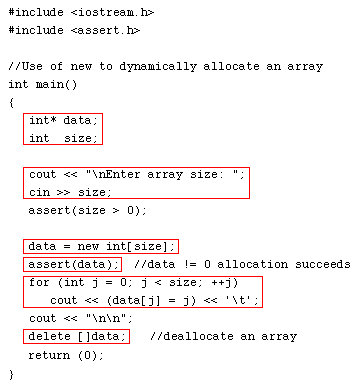| Lesson 11 | C++ Dynamic Arrays |
| Objective | Understand dynamic arrays with new[]/delete[] and modern RAII alternatives such as std::vector and std::unique_ptr. |
C++ Dynamic Arrays: new[]/delete[] vs std::vector
In C++ you can obtain dynamically sized storage at run time. Historically this was done with
new[] and released with delete[]. In modern C++, the preferred approach is to use
RAII containers such as std::vector<T> or smart pointers (e.g., std::unique_ptr<T[]>),
which free memory automatically and add safety features such as bounds-aware access and exception safety.

data acts as the base address of a dynamically allocated array with
size elements. Each subscripted access like data[j] performs pointer arithmetic relative
to this base address.
Raw Dynamic Allocation with new[] (for comparison)
The following minimal example shows legacy-style allocation with new[]. It compiles, but it’s
easy to get wrong: you must pair new[] with delete[], use the correct type for sizes, and
avoid reading uninitialized elements.
#include <iostream>
#include <vector> // only for later contrast
#include <cassert>
int main() {
using std::cout;
using std::cin;
std::size_t size{};
cout << "Enter array size: ";
cin >> size;
assert(size > 0);
int* data = new int[size]; // allocate size ints
// Initialize values to something meaningful before printing:
for (std::size_t j = 0; j < size; ++j) {
data[j] = static_cast<int>(j);
}
for (std::size_t j = 0; j < size; ++j) {
cout << data[j] << '\t';
}
cout << '\n';
delete[] data; // must use delete[] for arrays
}
What to notice
- Pointer as base address:
datapoints to the first element;data[j]is computed via pointer arithmetic. - Initialization matters: Printing before assigning produces indeterminate values.
- Exception behavior:
newthrowsstd::bad_allocon failure (it no longer returnsnullptrin standard builds). A production program should catch this. - Deallocation symmetry:
new[]must be paired withdelete[](not plaindelete).
Modern, Safe Alternative: std::vector<int>
Prefer std::vector for resizable arrays. It owns its memory, initializes elements, supports
.size(), offers bounds-checked access with .at(), and integrates with algorithms.
#include <iostream>
#include <vector>
#include <numeric> // std::iota
int main() {
using std::cout;
using std::cin;
std::size_t size{};
cout << "Enter array size: ";
cin >> size;
std::vector<int> data(size); // RAII-managed dynamic array
std::iota(data.begin(), data.end(), 0); // fill with 0,1,2,...
for (std::size_t j = 0; j < data.size(); ++j) {
cout << data[j] << '\t';
}
cout << '\n'; // automatic cleanup; no delete[] needed
}
Why vector is better
- Automatic lifetime: No manual
delete[]. - Safety: Optional bounds checks via
data.at(j)(throws on error). - Algorithm-friendly: Works with the STL (e.g.,
std::iota,std::sort). - Exception-safe: If an exception occurs, memory is still freed when
datagoes out of scope.
When You Need a Raw Array Interface
Some legacy APIs require a raw pointer. Use a smart pointer to keep RAII while honoring the API’s signature.
#include <iostream>
#include <memory> // std::unique_ptr
#include <algorithm>
int main() {
std::size_t size = 8;
auto data = std::make_unique<int[]>(size); // RAII for dynamic arrays
for (std::size_t j = 0; j < size; ++j) data[j] = static_cast<int>(j * j);
// Pass data.get() to functions that need int*.
std::for_each(data.get(), data.get() + size, [](int v){ std::cout << v << '\t'; });
std::cout << '\n';
// No delete[] needed; unique_ptr frees memory automatically.
}
Common Pitfalls & How to Avoid Them
- Reading uninitialized memory: Always assign before reading. Prefer containers that default-initialize.
- Mismatched deallocation: Pair
new[]withdelete[]—never plaindelete. - Leaking memory on early return/exception: Favor RAII (
std::vector,std::unique_ptr). - Signed vs. unsigned indices: Use
std::size_tfor sizes/indices to avoid negative values. - Manual resizing:
new[]arrays can’t be resized; usestd::vector::resizeinstead.
From C Arrays to C++ Abstractions
C-style arrays provide no bounds checking and no size tracking. C++ adds powerful abstractions that make dynamic arrays safer and more expressive:
std::vector<T>— resizable dynamic array (default choice).std::array<T,N>— fixed-size array with size information at compile time.std::span<T>— lightweight, non-owning view over a contiguous sequence.std::unique_ptr<T[]>— owning smart pointer for raw array interoperability.
Exercises
- Vector basics: Read
n, createstd::vector<int>of sizen, fill withi, print in reverse. - Bounds check: Rewrite a loop using
.at()and catch the exception on an out-of-range index. - Smart pointer interop: Allocate with
std::make_unique<int[]>, compute prefix sums in-place, and print.
Appendix: Updated Legacy Dissection (Modernized Headers)
#include <iostream>
#include <cassert>
int main() {
using std::cout;
using std::cin;
std::size_t size{};
cout << "Enter array size: ";
cin >> size;
assert(size > 0);
int* data = new int[size];
for (std::size_t j = 0; j < size; ++j) {
data[j] = static_cast<int>(j);
cout << data[j] << '\t';
}
cout << "\n";
delete[] data;
}
New Storage Allocation - Exercise
new.
New Storage Allocation - Exercise